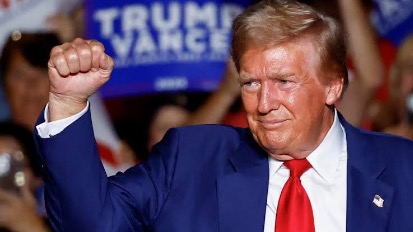The return of Donald Trump to the White House as the 47th President of the United States, following his significant win over Kamala Harris, raises new considerations for Nigeria’s economic future.
Trump’s “America First” policies, which emphasize domestic energy production, tariffs on imports, and advocating for low interest rates, could impact Nigeria’s economic dynamics in several ways. Areas like exchange rates, capital flows, inflation, and immigration may all be affected by these shifts.
Key Highlights:
•Trump’s second term may bring significant changes to Nigeria’s economy.
•A stronger dollar, capital outflows from the U.S., and low global oil prices could contribute to exchange rate instability in Nigeria, further weakening the naira and raising inflation.
•Immigration restrictions could reduce remittance flows, while shifts in geopolitical priorities could lessen U.S. support for Nigeria’s security and development.
•Nigerian policymakers might need to adopt strategies such as enhancing regional trade, boosting non-oil exports, and pursuing structural reforms to offset potential challenges posed by Trump’s policies.
Impact of a Stronger Dollar on Exchange Rates
Trump’s economic policies may result in a stronger U.S. dollar, particularly if tariffs drive greater demand for American-made goods and services. A stronger dollar tends to make it more expensive for emerging markets like Nigeria to obtain foreign exchange, putting pressure on the Central Bank of Nigeria’s (CBN) efforts to stabilize the naira. With the naira already having depreciated by over 45% this year, any further strengthening of the dollar could exacerbate its decline, raising import costs, inflation, and decreasing purchasing power.
A stronger dollar would also increase Nigeria’s dollar-denominated debt servicing costs, further straining the economy. Given Nigeria’s dependence on imports for fuel and consumer goods, this scenario could add to inflationary pressures, making basic goods more expensive for Nigerians.
Interest Rates and Capital Flows
Trump’s administration has historically supported low interest rates, advocating for a loose monetary policy even during periods of economic growth. If the Federal Reserve maintains low rates, this might result in capital outflows from the U.S. as investors seek higher returns in emerging markets like Nigeria.
Between 2016 and 2020, Nigeria attracted over $58 billion in capital inflows, including significant investments from U.S.-based investors. If U.S. interest rates remain low, Nigeria could once again benefit from such inflows, particularly if it continues offering attractive yields on its debt instruments, potentially easing the pressure on the country’s foreign exchange reserves.
Inflation and Oil Price Dynamics
Trump’s energy policies, including increasing domestic oil production, could contribute to low global oil prices. This was seen in his first term when oil prices plummeted due to a combination of his policies and the COVID-19 pandemic. As Nigeria’s economy is heavily dependent on oil exports, prolonged low oil prices could negatively impact government revenue and exacerbate inflation.
Moreover, Trump’s proposed tariffs on imports, particularly a 60% levy on Chinese goods, could trigger higher inflation within the U.S., a trend that may have ripple effects in Nigeria due to rising costs of imported goods. The U.S. is one of Nigeria’s primary trade partners, and any increase in the cost of goods like machinery, pharmaceuticals, and agricultural products could push inflation higher in Nigeria.
Immigration and the Nigerian Diaspora
Trump’s stance on immigration could have consequences for Nigerians wishing to pursue opportunities in the U.S. His previous administration imposed travel restrictions on Nigeria, impacting students, professionals, and families. If such policies are reinstated, this could dampen Nigerians’ ability to work or study in the U.S., and could also reduce remittances, a crucial source of foreign exchange for Nigeria.
In recent years, remittances from Nigerians abroad have contributed significantly to the economy, with over $20 billion sent home annually. A decline in remittances could worsen Nigeria’s foreign exchange challenges and reduce domestic consumption.
Geopolitical Dynamics and U.S. Aid to Nigeria
Trump’s “America First” foreign policy generally deprioritized military aid and development assistance to African nations. For Nigeria, a reduction in U.S. support, especially in counter-terrorism and military aid, could undermine efforts to combat insurgencies like Boko Haram. Furthermore, a cut in development assistance could affect Nigeria’s social and infrastructure projects, which rely heavily on U.S. funding.
Trade Policies and Nigeria’s Exports to the U.S.
Trump’s “Buy American” policy, which focuses on reducing imports and raising tariffs, could disrupt Nigeria’s trade relations with the U.S. Nigeria recently enjoyed a trade surplus with the U.S., but any increase in tariffs could reduce U.S. demand for Nigerian exports, particularly in oil, minerals, and agricultural products. A reduction in exports to the U.S. could further strain Nigeria’s current account balance and exacerbate challenges related to exchange rates and foreign reserves.
